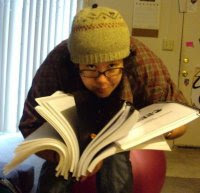Prepare for rambling...
What is so striking about this idea for me is the way this text, or rather my reading of this text, establishes a close relationship between scientific, mechanic and market forces in futile opposition against nature and identity.
This final line is tremendously loaded. Following the destruction of the bridge and the death of Bartley (and many of his workers), this line seems at first glance to allude only to the death of the protagonist, but for me it is suggestive of so much more.
Allusion to the mind suggests the scientific energy of the Professor, which is predominantly voyeuristic and taxonomic. Emblematic of the mind and connected with Psychology, the Professor seeks to document, organize, and control the natural force of human thought and behavior just as the mechanical force of Bartley's bridge building and engineering. Furthermore I think other forces are also subtly implicated such as notions of romance, and the forces of the market, which also seem to be reliable forces "in service" of society, yet act in this text to bring about destruction.
Although by the end of the work most readers seem to regard Bartley Alexander as an unsympathetic character who has perhaps used and manipulated those around him, (as the Professor suggests, "He belonged to the people who make the play, and most of us are only onlookers at best") I think this assessment is deeply complicated by B.A.'s own sense of his lost identity.
A number of times in the text it is suggested that B.A. has progressively lost control of his identity. This suggestion is made explicit in his letter to Hilda. The text also seems to couple this loss of identity with a move away from the west where Bartley was raised. Although this loss is initially perceived as a loss of youth, or a quest to regain the energy and bliss of young love, it seems as though the reunion with Hilda is insufficient precisely because it does not allow Bartley to regress far enough, to a place where he felt he still had command of himself.
This agency of youth seems linked to nature, the very thing that the protagonist in his maturity has worked successfully to overcome.
I don't know...just some thoughts.


2 comments:
sounds like male menopause to me.
people most people anyway are not what you are looking at.I guess its that inner child again .we have many dreams going on.I guess it can be as simple as choosing to be happy.not looking for others to do it for us.anyway,it was a pleasant little story. peace
Post a Comment